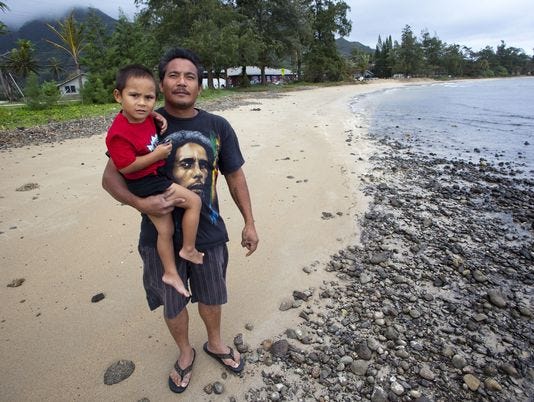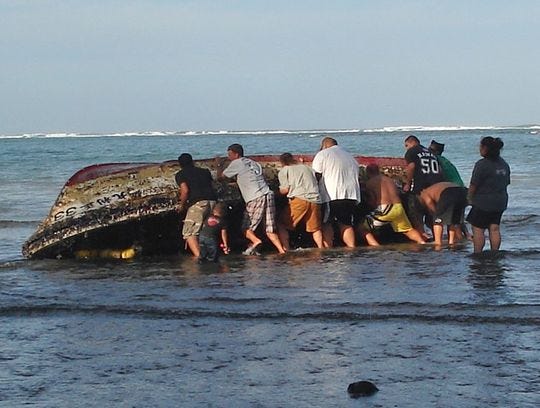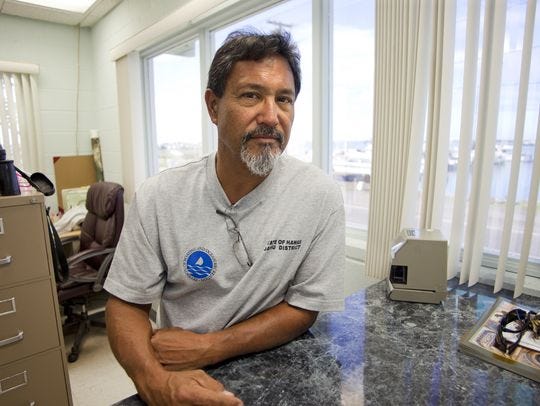What do you think about this boat recovery story Marine Asst
Posted: Mon Mar 11, 2013 11:06 am
http://www.usatoday.com/story/news/nati ... s/1976281/
A boat ashore: Blessing, or tsunami debris?
Steve LaBadessa, Special for USA TODAY3:51a.m. EDT March 11, 2013
Finding a boat that washed up on Oahu raised the hopes of a Hawaiian family — but their dream of keeping it apparently was dashed when the government seized it as tsunami debris.
(Photo: Steve LaBedessa, Special for USA TODAY)
PUNALUU BEACH, Oahu — Two days before Christmas 2012, Leilehualani Kane-Tapado found a 24-foot fishing boat on the beach across the street from her home on the windward side of this island. The craft was upside-down and had Japanese characters on it.
She'd always wanted a boat but could never afford one, so it seemed like a gift from the sea.
But there's a problem: The boat is, for all intents and purposes, a piece of debris that floated ashore from the 2011 Japanese tsunami. (Japan is marking the second anniversary of the tsunami on Monday.) And as such, it is at the center of a firestorm of controversy over tsunami debris and Kane-Tapado's right to keep what she found.
Kane-Tapado, a health-care worker and mom, has claimed the boat as her own. Local neighbors helped turn the boat upright, and she brought it to her home and celebrated by dancing a hula on it. Her family had a feast with the barnacles that were attached to the hull.
She imagined a boat would change her family's life. The boat would help her teach her son about navigation and the old Hawaiian ways. It could provide them with food and exercise.
"This boat is perfect for net fishing," says Rhamil Tapado, Kane-Tapado's husband. He believes the boat will make his family more self-sufficient.
The newfound boat attracted a lot of attention. At first it was neighbors, then local news organizations, and finally the Department of Land and Natural Resources (DLNR).
Last month, the National Oceanic and Atmospheric Administration (NOAA) began to take an interest. The boat is among the 17 confirmed pieces of tsunami debris certified by NOAA. Others include two floating piers, two soccer balls, and a motorcycle that washed ashore between Alaska to Oregon.
A boat suspected of being tsunami debris is righted last December on Punaluu Beach on the island of Oahu. Rhamil Tapado, at far left in the black shirt, hopes he can keep it.(Photo: Leilehualani Kane-Tapado)
Tsunami debris landing in the Hawaiian Islands is cause for concern, not celebration, according to the U.S. government. "The boat is a foreign vessel that has entered Hawaiian waters; we have to investigate it," says Paul Sensano of the DLNR. For instance, he said, the department is concerned about the non-native species of green clams that were attached to the boat.
The natural resources police seized the vessel three days after Kane-Tapado found it. They removed the boat from the backyard of a church in Punaluu where Kane-Tapado brought it to be blessed. DLNR moved the boat to a dry-dock facility in Honolulu and reported its registration numbers to the Japanese consulate in the hopes of finding the owner.
"If no one (from Japan) claims the boat we have to keep it till the statute of limitation runs out — that's 7 years. After that, the first person who found the boat would have a (valid) claim, but it would have to go to civil court," says Sensano.
Kane-Tapado and many native Hawaiians are sensitive to U.S. government involvement in Hawaiian affairs. This boat touched tender nerves. Kane-Tapado sees the seizure of the boat as another example of how the American government is intruding into Hawaiian affairs.
"They take away our land, they disrespect our culture," she said, "and now they take this boat from us." Kane-Tapado believes this is strictly between her and the Japanese owner. "The government has no jurisdiction here," says Kane-Tapado.
Recent cases regarding boat salvage have sided with the original owner. Anyone finding a boat is required to return it. The person may or may not receive compensation depending on how difficult or dangerous it was to retrieve the boat. In Kate-Tapado's case, the boat was simply righted and pulled ashore.
Paul Sensano works in his office at the Hawaii Department of Land and Natural Resources.(Photo: Steve LaBedessa, Special for USA TODAY)
Kane-Tapado thinks the state has ulterior motives. She suspects the DLNR is interested in collecting some of the $5 million the Japanese government has pledged to the U.S. to help clean up tsunami debris. "For the state, it's all about the money," says Kane-Tapado
Kane-Tapado is sympathetic to whoever lost the boat. She posted a message about the missing boat online and even looked on the Japanese Coast Guard website to find the owner.
"(For now) I want to be a steward of the boat. I will treat her like the special warrior she is. If the owner is found and he wants it back, I'll give the boat to him. For now we can make use of it. It would be such a help to our family," says Kane-Tapado.
It doesn't seem likely that Kane-Tapado will get her chance to use and care for the boat. The state of Hawaii is waiting for direction from the Japanese consulate. Even if the owner can't be found, Kane says she can't afford to fight the state in court to claim the boat.
Ultimately, Kane hopes the boat's owner is found and he'll decide to let the Kane-Tapado family keep the vessel.


